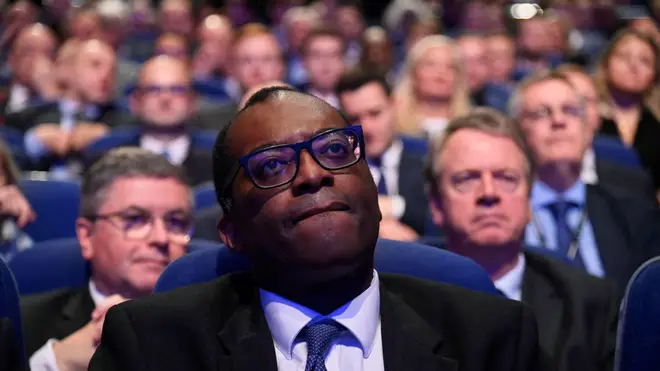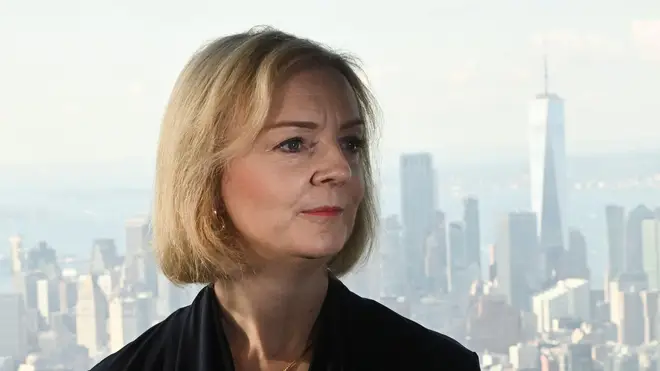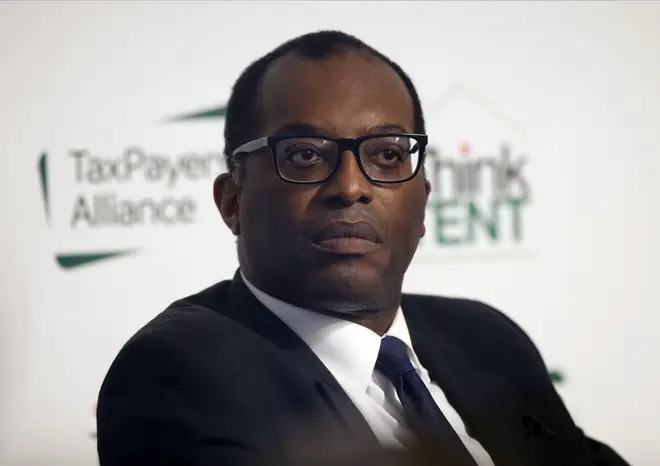
Richard Spurr 1am - 4am
11 October 2022, 16:10

The International Monetary Fund has criticised chancellor Kwasi Kwarteng again over his controversial mini-budget which has sent markets into a panic.
While the Treasury's latest measures could improve the UK's economic growth in the short term, the IMF expects it will sharply reduce in 2023 as consumer spending catches up with rampant inflation and higher interest rates.
Mr Kwarteng's £45 billion package of tax cuts - funded by more public borrowing and benefiting mainly the wealthy - will "complicate" the Bank of England's attempts to curb inflation.
Prime minister Liz Truss insists government's plan will boost economic growth which will be felt by lower earners as she embraces a strategy of "trickle down economics" despite plenty of criticism.
But the IMF has concerns this will lead to a rise in prices as many ordinary Britons are already struggling to make ends meet.

James O'Brien lambasts Liz Truss and Kwasi Kwarteng as he slams 'prioritisation of profit' in UK
The Washington DC based body's economic counsellor Pierre-Olivier Gourinchas said: “As storm clouds gather, policymakers need to keep a steady hand.
“Increasing price pressures remain the most immediate threat to current and future prosperity by squeezing real incomes and undermining macroeconomic stability.”
It comes after the IMF made an out-of-character criticism of Mr Kwarteng's proposals, urging him to "reevaluate" his tax plans as they are likely to increase inequality.
In the UK, the economy is projected to grow at a rate of 3.6% in 2022, a 0.4% upgrade from the IMF’s previous forecast in July.
However, growth will then fall sharply to just 0.3% in 2023 with the IMF downgrading its forecast by 0.2% from a previous 0.5% estimate.

Globally, the forecast for growth remains unchanged at 3.2% for 2022. However, the IMF’s economists cut their guidance for the year ahead to 2.7% from a previous 2.9% projection.
The institution's World Economic Outlook report said "the worst is yet to come" and that "for many people 2023 will feel like a recession".
Just Germany and Italy will see weaker growth than the UK among the world’s advanced economies, with the IMF forecasting decline for both countries in 2023.
Britain and other countries have recently hiked base interest rates, borrowing more expensive for households and businesses in a bid to cool down the economy.
The Bank of England’s interest rate is currently 2.25% and is expected to be raised further at the next meeting of decision makers in November.
This is set to take its toll next year as consumers cut back on spending and businesses slow down investments, resulting in slower growth, the IMF said.
The body noted that its forecast was prepared before the Government unveiled its mini-budget which set out sweeping tax cuts including on stamp duty and income tax.
It said: “The fiscal package is expected to lift growth somewhat above the forecast in the near term, while complicating the fight against inflation.”

The fund added that there have been investor concerns about the UK’s fiscal and inflation outlook since the debt-financed tax cuts were announced. The announcement caused the value of the pound to plummet, which made inflation worse.
Earlier the Bank of England warned of a "material risk" to Britain's financial stability as it announced it would buy more government bonds in an attempt to stabilise their price.
It marks the second time the central bank has expended its rescue package, as investors remain nervous about such a huge tax giveaway at the expense of public debt.
Read more: Chancellor brings forward ‘Halloween budget’ debt plan to October 31
It decided to step in on September 28 after an unprecedented sell-off of government bonds, known as gilts, put the survival of many pension funds at risk.
Deputy Prime Minister Therese Coffey has insisted people’s pensions and the UK’s public finances are in a "good state" this morning.
She said today: "I'm absolutely confident pensions are safe, the Bank of England is independent and undertaking its role in trying to bring some stability, which it had done.”
Ms Coffey denied that the chancellor decided to bring his medium-term fiscal plan forward to October 31 because of market jitters.